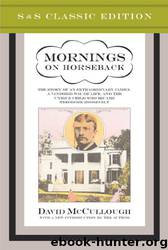Mornings on Horseback: The Story of an Extraordinary Faimly, a Vanished Way of Life and the Unique Child Who Became Theodore Roosevelt by David McCullough

Author:David McCullough [McCullough, David]
Language: eng
Format: epub
Tags: Biography & Autobiography, Presidents & Heads of State, History, United States, 19th Century, State & Local, Middle Atlantic (DC; DE; MD; NJ; NY; PA), General
ISBN: 9780743218306
Google: nuzmvrqPvdIC
Publisher: Simon and Schuster
Published: 2007-05-31T04:00:00+00:00
But the letter is so plainly Theodore’s idea of humor—tall-tale humor out of the Wild West—that it suggests there was no “problem” as yet. That he would treat a subject of such seriousness in so open and bantering a vein would seem a sign that neither he nor Elliott nor any of them was very concerned.
As Elliott and Theodore proceeded on their western expedition, it was Elliott who got on most readily with the people encountered—male and female—some of whom, according to Theodore, were “pretty rough.” Elliott’s natural, easy way with people cut across barriers of class or background, an attribute Theodore could only admire, and doubtless Elliott’s past experiences in Texas gave him confidence of a kind Theodore lacked.
“Last Sunday night we got this motley crew together to sing hymns,” Mittie read in one of Theodore’s letters, this dated August 25,1880, from a farm in Illinois; “thanks to Elliott it was a great success. It was all I could do to keep a sober face when I saw him singing from the same book with the much-flattered Mrs. Rudolf and Miss Costigan.”
The trip had been badly planned. With no clear idea where to go, they kept trying different spots, first in Illinois, then Iowa and Minnesota, taking time out in Chicago between each foray to recuperate and figure their next move. The flies were dreadful in Illinois and on a lake in Iowa they both nearly drowned when their rowboat capsized. But they saw it as their last chance for an adventure together, entirely on their own, which probably would have been reason enough for going in the first place, quite aside from Theodore’s health. “I enjoy being with the old boy so much,” Theodore said. “I am so glad ... we two brothers have been able at last to be together,” wrote Elliott. “All the happier we are solely dependent on each other for companionship. . .”
Theodore had become violently ill during a midsummer visit to Bar Harbor with Alice, Rose, and Dick Saltonstall. He had weathered his final examinations at Harvard, Class Day, graduation, the excitement of having Alice as a guest at Oyster Bay, all with no ill effect, only to be struck down in embarrassing fashion in far-off Maine. He was hit by violent diarrhea, his old cholera morbus (”very embarrassing for a lover,” as he told Corinne), and to Mittie he declared a trip west would be just the thing to put him back on his feet and build him up.
What he did not tell her—or Alice or Elliott, so far as we know—was that he had also received some extremely disquieting news from the college physician as far back as March. He had gone for a routine physical examination, at the conclusion of which Dr. Dudley A. Sargeant told him he had “heart trouble.” Of what variety, or whether that was even discussed, we do not know and it was only years later that Theodore ever talked about the incident. But apparently he was warned he must live a quiet life, choose a relatively sedentary occupation.
Download
This site does not store any files on its server. We only index and link to content provided by other sites. Please contact the content providers to delete copyright contents if any and email us, we'll remove relevant links or contents immediately.
Fanny Burney by Claire Harman(26591)
Empire of the Sikhs by Patwant Singh(23066)
Out of India by Michael Foss(16838)
Leonardo da Vinci by Walter Isaacson(13303)
Small Great Things by Jodi Picoult(7110)
The Six Wives Of Henry VIII (WOMEN IN HISTORY) by Fraser Antonia(5493)
The Wind in My Hair by Masih Alinejad(5084)
A Higher Loyalty: Truth, Lies, and Leadership by James Comey(4944)
The Crown by Robert Lacey(4798)
The Lonely City by Olivia Laing(4795)
Millionaire: The Philanderer, Gambler, and Duelist Who Invented Modern Finance by Janet Gleeson(4456)
The Iron Duke by The Iron Duke(4344)
Papillon (English) by Henri Charrière(4250)
Sticky Fingers by Joe Hagan(4181)
Joan of Arc by Mary Gordon(4090)
Alive: The Story of the Andes Survivors by Piers Paul Read(4014)
Stalin by Stephen Kotkin(3949)
Aleister Crowley: The Biography by Tobias Churton(3626)
Ants Among Elephants by Sujatha Gidla(3458)
